Brazil condemned for disappearance of 11 youths in 1990 Acari Case

The Inter-American Court of Human Rights (IACHR) has condemned Brazil for the forced disappearance of 11 young residents of the Acari favela in Rio de Janeiro's northern zone in 1990. The case led to the formation of the activist group Mães de Acari (Acari´s Mothers). The ruling was announced on Wednesday (Dec. 4) in San José, Costa Rica, where the IACHR is headquartered.

IACHR is an autonomous judicial body of the Organization of American States (OAS) responsible for applying and interpreting the American Convention on Human Rights, also known as the Pact of San José de Costa Rica. This international treaty safeguards fundamental rights and freedoms. Brazil is among the 20 countries that recognize the court's jurisdiction.
The case leading to the condemnation of the Brazilian state involves the disappearance of 11 residents of Acari on July 26, 1990. The victims were last seen at a farm in Magé, a municipality in Rio de Janeiro state.
Around 11 p.m., a group of approximately six hooded men stormed the home of one victim's grandmother and abducted Wallace Souza do Nascimento, Hédio Nascimento, Luiz Henrique da Silva Euzébio, Viviane Rocha da Silva, Cristiane Leite de Souza, Moisés dos Santos Cruz, Edson de Souza Costa, Luiz Carlos Vasconcellos de Deus, Hoodson Silva de Oliveira, Rosana de Souza Santos, and Antônio Carlos da Silva.
The hooded men identified themselves as police officers and demanded money. They were reportedly members of the "Running Horses," an extermination group composed of police officers that operated in the Acari favela.
Their whereabouts remain unknown. The IACHR highlights that the young people were Black, with eight of them being teenagers between the ages of 13 and 18. To this day, most families have not been granted the right to obtain death certificates for their loved ones.
Judgment
The court noted that a lawsuit in Brazil was dismissed on April 10, 2011, due to a lack of "sufficient evidentiary support." Additionally, a lawsuit for material and moral damages filed by some of the victims' relatives against the state of Rio de Janeiro has been deemed time-barred.
The decision also states that Edméa da Silva Euzébio, the mother of one of the disappeared and a prominent leader of the Mothers of Acari, was murdered in 1993 in downtown Rio de Janeiro. Her killing occurred shortly after she reported police involvement in the disappearances to the courts. A niece accompanying her was also killed.
The Mothers of Acari gained widespread recognition for their demand for progress in the investigations and accountability for the crime. The movement continues to thrive and advocate for justice to this day.
In April of this year, the police officers accused of the crime were acquitted due to insufficient evidence.
The IACHR judges determined that the Brazilian state was responsible for “violating the rights to legal recognition, life, personal integrity, and liberty.” They also found that the state “failed to conduct a thorough, objective, and effective investigation to uncover the truth.”
Reparations
The Brazilian state was ordered to implement several measures, including continuing the investigation into the disappearance, conducting a thorough search for the victims, and holding a public act to acknowledge international responsibility. Additionally, the state was directed to establish a memorial space in the Acari neighborhood, provide appropriate medical and psychological support for the families, offer financial reparations to the victims, and conduct a study on the activities of militias and extermination groups in Rio de Janeiro.
Before reaching the IACHR, the case was brought before the Inter-American Commission on Human Rights, another OAS body, which issued a series of recommendations to the Brazilian state in 2006. However, these recommendations were not implemented. As a result, the case was escalated to the IACHR, a higher body, which began its trial in October 2023.
The ruling is expected to be delivered to the Minister of Human Rights and Citizenship, Macaé Evaristo dos Santos, next week.



